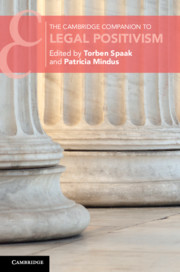Book contents
- The Cambridge Companion to Legal Positivism
- Cambridge Companions to Law
- The Cambridge Companion to Legal Positivism
- Copyright page
- Contents
- Figures
- Contributors
- Acknowledgements
- 1 Introduction
- Part I Fundamentals
- Part II History
- Part III Central Figures
- Part IV Main Tenets
- 17 Social-Practice Legal Positivism and the Normativity Thesis
- 18 Social Facts and Legal Facts: Perils of Hume’s Guillotine
- 19 The Scope of Legal Positivism: Validity or Interpretation?
- 20 What Is Law and What Counts as Law? The Separation Thesis in Context
- 21 The Origins of Inclusive Legal Positivism
- 22 Disruptive Implications of Legal Positivism’s Social Efficacy Thesis
- 23 The Semantic Thesis in Legal Positivism
- Part V Normativity and Values
- Part VI Critique
- Index
- References
19 - The Scope of Legal Positivism: Validity or Interpretation?
from Part IV - Main Tenets
Published online by Cambridge University Press: 21 January 2021
- The Cambridge Companion to Legal Positivism
- Cambridge Companions to Law
- The Cambridge Companion to Legal Positivism
- Copyright page
- Contents
- Figures
- Contributors
- Acknowledgements
- 1 Introduction
- Part I Fundamentals
- Part II History
- Part III Central Figures
- Part IV Main Tenets
- 17 Social-Practice Legal Positivism and the Normativity Thesis
- 18 Social Facts and Legal Facts: Perils of Hume’s Guillotine
- 19 The Scope of Legal Positivism: Validity or Interpretation?
- 20 What Is Law and What Counts as Law? The Separation Thesis in Context
- 21 The Origins of Inclusive Legal Positivism
- 22 Disruptive Implications of Legal Positivism’s Social Efficacy Thesis
- 23 The Semantic Thesis in Legal Positivism
- Part V Normativity and Values
- Part VI Critique
- Index
- References
Summary
Spaak argues that legal positivists need to consider the social thesis in light of an important distinction between two levels of legal thinking, namely, the level of the sources of law (existence) and the level of the interpretation and application of law (content), and that they have good reason to restrict the scope of the social thesis to the level of the sources of law. He argues that by restricting the scope of the social thesis in this way, inclusive legal positivists can avoid having to assume that moral judgements can be true in a non-relative way, that exclusive legal positivists can avoid having to say that judges are creating new law instead of applying pre-existing law, if and insofar as they invoke normative considerations in their interpretation and application of the law, and that both inclusive and exclusive legal positivists can avoid Dworkin’s theoretical disagreement objection.
- Type
- Chapter
- Information
- The Cambridge Companion to Legal Positivism , pp. 443 - 464Publisher: Cambridge University PressPrint publication year: 2021
References
- 5
- Cited by

